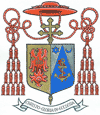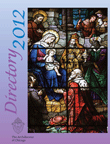
The Cardinal's Column
Francis Cardinal George, O.M.I.
Will the real Vatican II please stand up?
Cardinal George's Schedule
- June 11: 10:30 a.m., Youth 2000 Retreat Mass, St. Benedict, Irving Park; 3 p.m., Lumen Cordium Society Mass and Reception, Mundelein; 6:30 p.m., Lay Ministry Colloquium Banquet, Loyola University
- June 12: 8:45 a.m., Lay Ministry Colloquium, Loyola University, (Lakeshore Campus)
- June 13 - 14: Bishops Committee on the Liturgy Meeting, Los Angeles
- June 15 - 17: U.S. Conference of Catholic Bishops Spring Assembly, Los Angeles
- June 18: 12:30 p.m., Sunday Mass, Holy Name Cathedral; 3 p.m., Corpus Christi Benediction Service, St. Hyacinth Basilica.
- June 19: 7 p.m., Confirmation Liturgy, Holy Name Cathedral
- June 20: 1 p.m., Administrative Council Meeting; 4 p.m., Senior Priests’ Dinner, Mundelein Seminary
- June 22: 7 a.m., Department Directors Meeting, Residence; 6 p.m., Legatus Mass, St. Paul of the Cross
- June 23: 5:30 p.m., Knights of Malta Mass
- June 24: 8:30 a.m., American Theological Library Association Meeting, Assumption; 1:30 p.m., Association of Theological Schools Meeting, Hyatt Regency McCormick Place

Cardinal's Appointments
His Eminence, Francis Cardinal George announces the following appointments:
Pastor
Rev. John Atoyebi, to be the pastor of Holy Angels Parish, East Oakwood Blvd., while retaining his duties as the pastor of St. Clotilde Parish, South Calument, effective immediately.
Administrator
Rev. Samson Mukundi, from associate pastor of St. Benedict the African East, West 66th Street, to be the administrator of St. Benedict the African West, West 71st Street, effective immediately.
Rev. Joseph Peplansky, CMF, to be the administrator of Our Lady of Guadalupe Parish, East 91st Street, effective immediately.
Associate pastor
Rev. David J. Cortesi from sabbatical to be the associate pastor of St. Hilary Parish, North Fairfield, effective immediately.
Newly ordained
Rev. Thomas G. Belanger to be the associate pastor of St. Philip Neri Parish, East 72nd Street, effective July 1.
Rev. Arkadiusz Falana to be the associate pastor of Queen of All Saints Parish, North Sauganash, effective July 1.
Rev. Pawel Komperda to be the associate pastor of Prince of Peace Parish, Lake Villa, effective July 1.
Rev. Jose de Jesus Medina-Carreón to be the associate pastor of St. Bede the Venerable Parish, South Kostner, effective July 1.
Rev. Bolivar Guillermo Molina-Ramirez to be the associate pastor of Good Shepherd Parish, South Kolin, effective July 1.
Rev. Hugo Morales to be the associate pastor of Mary, Queen of Heaven Parish, Cicero, effective July 1.
Rev. (Ambrose) Phi Nguyen to be the associate pastor of St. Damian Parish, Oak Forest, effective July 1.
Rev. Benedykt M. Pazdan to be the associate pastor of St. John the Evangelist Parish, Streamwood, effective July 1.
Rev. Avitus L. Rukuratwa to be the associate pastor of Sacred Heart Parish, Winnetka, effective July 1.
Rev. Adan Sandoval Duron to be the associate pastor of St. Michael Parish, Orland Park, effective July 1.
Rev. Artur Sowa to be the associate pastor of St. Julie Billiart Parish, Tinley Park, effective July 1.
Rev. Fernando Zuleta to be the associate pastor of Resurrection Parish, North Francisco, effective July 1.
President
Rev. I. Scott Donahue, to be the president of Mercy Home, West Jackson Blvd., effective immediately.
President/rector
Very Rev. Peter Snieg, from rector of Archbishop Quigley Preparatory Seminary, to be the president/rector of the same, effective July 1.
In the time after Pentecost, the Church considers the impact of the Holy Spirit in her life. Individuals often speak of an inspiration, of feeling led by the Spirit. Works of mercy and compassion get organized against all odds. In the midst of serious disputes, unity of faith and life is preserved. In the Church’s common life, an Ecumenical Council is one of the events that is guided by the Holy Spirit. The Spirit guards the Church in every age from abandoning the apostolic faith, and a Council is an instrument for strengthening that faith from generation to generation.
The Second Vatican Council (1962-1966), 40 years after its conclusion, remains for many Catholics a source of both joy and tension. What was the Holy Spirit calling us to think and to do? For some, the Council itself was the work of the Spirit, but its implementation has been hijacked by left-wing or right-wing ideologues, depending upon one’s choice of enemies. For others, the Council itself was flawed because its documents are ambiguous or even inconsistent with apostolic tradition. The extremists in this line made tradition another word for museum and lose the sense of a living Body of Christ. Some even believe that Pope John XXIII and all his successors are anti-Popes and that the Church has been without a Bishop of Rome since the death of Pius XII in 1958.
A few months ago, the current Bishop of Rome and successor of St. Peter, Pope Benedict XVI, offered an interpretation of the Second Vatican Council that merits close attention. The Council was called in order to give genuinely new impetus to the Church’s mission in the world. In order to overcome within the Church anything that might impede or obscure the Church’s mission, the Council called for an updating or renewal in the Church’s life. “Aggiornamento,” which is Italian for updating, was not, however, intended to mean that the Church should simply accommodate herself to the world. Ecclesiastical renewal is not a form of self-secularization. Pope Benedict says of those who took this path: “They have underestimated the inner tensions as well as the contradictions of the modern epoch.”
Pope Benedict contrasted two interpretations of the Council. One is a story of discontinuity and rupture with the Church’s past. It is as if the Church after the Council was a new, a different Church from all that had gone before. Where the texts of the Council did not support this interpretation, they were put aside in the name of the “spirit” of the Council. This is not to deny that a “spirit” of a meeting is always more than the texts it produces; it is to say that the Church’s development from one age to the next cannot be in contradiction with her apostolic origins. Among those arguing for rupture, some Americans found attractive the idea that a Council can reconstitute the Church with a mandate from the “people,” understood as separate from their pastors. But the essential structures of the Church come from Christ, and the bishops of Vatican II had no mandate from Christ to make a new Church or destroy the nature of their own apostolic office.
The more authentic interpretation of Vatican II, according to our Holy Father, sees the renewal or reform rooted in the tradition that links the Church to her apostolic origins. The Council did set out to give “a new definition of the relationship between the faith of the Church and certain essential elements of modern thought,” as Pope Benedict puts it, but in a way that “preserved and deepened the Church’s inmost nature and identity.” The Council’s emphasis on ecclesial communion means that everything and everyone in the Church is related. Nothing can be understood apart from our relationships among ourselves and with all those who have gone before us in faith. This communion or network of relationships across space and time is made vital through the action of the Holy Spirit. Synthesizing fidelity and the dynamics of renewal, the Pope states that: “The Church, both before and after the Council, was and is the same Church, one, holy, catholic and apostolic, journeying on through time; she continues her pilgrimage amid the persecutions of the world and the consolations of God, proclaiming the death of the Lord until he comes.”
Forty years after the end of the Council, its major documents are being taken up and studied again here and around the Catholic world. It is the Pope’s desire that these documents will give life to the Church a generation after they were first written in the hope of a new springtime for the Church’s mission in the world. That hope shaped the “spirit” of the Council and must remain with us now. To abandon hope is to sin against the Holy Spirit.
As the Council’s documents are re-read today, the question inevitably arises about the experience of the last 40 years of their implementation. Much that is positive and helpful in the Church today comes from the instructions of the Council. Much that is negative and destructive in the Church today comes, it seems to me, from fratricidal arguments about elements of the Church’s life and teachings, conflicts that distract Catholics from attending to the reason the Council was called: the conversion of the world.
The Holy Spirit is the spirit of truth, the personal expression of the love between the loving Father and the beloved Son. The Holy Spirit desires that the entire world know the truth about God, about ourselves and about the world itself. That divine desire is thwarted when the Church is not an eager and effective instrument of evangelization. The Holy Spirit works to make us an evangelizing Church. Let us pray to cooperate with the Spirit and to implement the Second Vatican Council more fully. God bless you.
Sincerely yours in Christ,
Francis Cardinal George, OMI
Archbishop of Chicago



